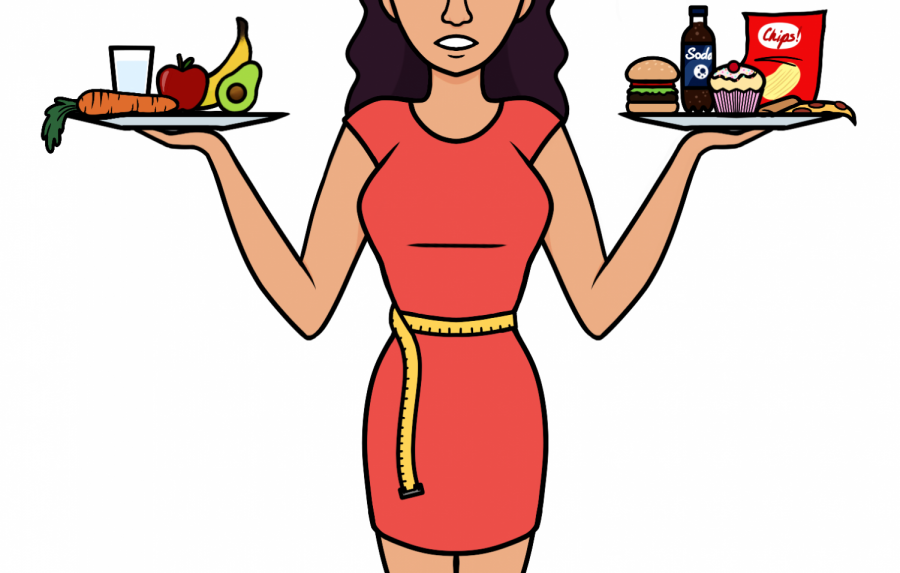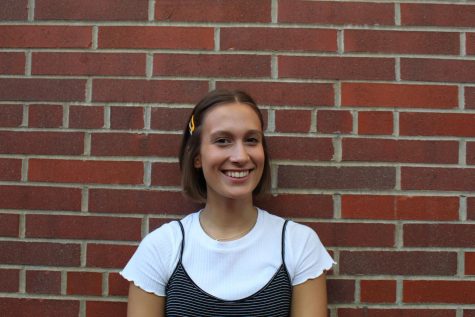Opinion: Diet Culture — The never-ending cycle that promotes negative body image
May 7, 2020
It’s different for everyone. Sometimes it’s waking up every morning to check the scale before deciding how much is acceptable to eat that day, or maybe it’s starving all day, only to finally give in to the cravings at night, followed by feelings of extreme guilt and shame. It could be obsessing over food every second of the day, or even exercising to the point of exhaustion because the temptation was too much. Whatever it may be, having a healthy relationship with food is something to be envied these days.
According to Boston Medical Center, an estimated 45 million Americans go on a diet each year, spending around $33 billion on weight-loss products. America has created a culture focused on dieting. Companies make millions of dollars off of various pills, supplements and programs offering to slim customers to the ideal shape, only to make even more profits when the diet inevitably fails. All of this, along with the “look” promoted and valued in social media, shapes an unhealthy relationship with food.
According to a study conducted by the American Dietetic Association (ADA) of almost 300 undergraduates, women tend to want to lose weight and turn to dieting more than men. It seems that during the spring, especially with the uncertainty and boredom that comes with being quarantined in a pandemic, we have about 1,000 different ways to fast track our “summer bod,” whether it be a disgusting drink that claims to help shred the extra pounds, or a “what I eat in a day” post only showing 1,000 calories.
Christy Harrison is a registered dietitian and outspoken leader in the weight-inclusive movement, which believes that everyone is capable of achieving health and well-being independent of weight and challenges the common belief that a particular weight or body shape reflects health practices, health status or moral character. She defines diet culture as a system that worships thinness as an almighty goal. Harrison believes that these beliefs oppress and damage the mental health of those who don’t fit the unattainable standard of “health,” such as women, transgender people, people of color and people with disabilities.
While these groups feel the most pressure from diet culture, everyone is affected regardless. Traci Mann, a Psychology teacher at the University of Minnesota, has been studying eating habits, self-control and dieting for more than 20 years in the University of Minnesota’s Health and Eating Lab. Her work studying eating habits provides helpful insight into why these diets don’t seem to work for so many.
Mann states that diet culture elevates thin people to a higher status, while making others spend countless hours, money and energy trying to shrink and fit the mold expected by society, despite research that proves intentional weight loss can not be sustained. A new diet, or “lifestyle,” promises new benefits and unbelievable results, so when those don’t actually happen, the blame falls on the dieter, not the diet. This cycle continues, leaving not only a feeling of shame, but a disordered relationship with food, instead of looking to food for nourishment and satisfaction.
“The truth is that everything causes dieters to lose control of what they’re eating. Because dieting is bound to fail, it is destined to fail,” Mann said in an interview with Washington Post reporter, Roberto Ferdman.
Mann has discovered three biological changes that are most important in understanding why it doesn’t matter how much self-control you have once you begin a diet; The first being neurological.
“When you are dieting, you actually become more likely to notice food. Basically, your brain becomes overly responsive to food, especially tasty looking food,” Mann said.
Since it isn’t noticeable that this is happening, the food you are trying so hard to resist just becomes harder to stay away from. Then, the level of the hormone that makes you feel full decreases, while the ones that make you feel hungry increase. Finally, your metabolism slows down, meaning that your body is using calories in the most efficient way.
While that sounds good, Mann said that “when your body finds a way to run itself on fewer calories, there tends to be more leftover, and those get stored as fat, which is exactly what you don’t want to happen.”
This is all great to know, but it doesn’t help that there is still a multi-million dollar industry benefiting off of the failure of diet culture and convincing people that they need help to look like a specific standard of health. Not only this, but the plethora of information flooding social media sites makes it hard to see food in a healthy way. It seems like every account says something different and deciding which to believe can be not only difficult, but possibly harmful to one’s well-being. According to a survey of 35 Southeast students, 77 percent said that social media posts related to dieting are overwhelming.
It may feel like this is all a dark hole that you’re bound to fall into, but there are people out there trying to combat the issues that surround diet culture. Books such as “Intuitive Eating,” by Elyse Resch and Evelyn Tribole, hope to teach people to let go of rules surrounding food and listen to what their body is craving. It emphasizes health as a very personal journey that can take time and serious effort. Have compassion for yourself, and don’t say something to yourself that you wouldn’t say to your best friend.









